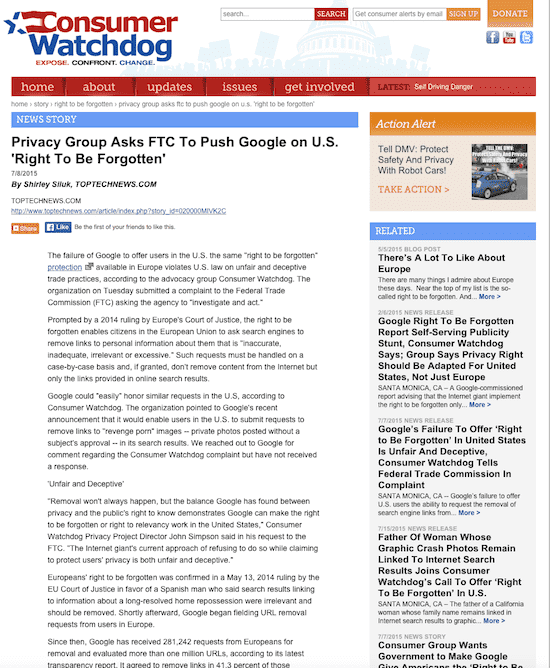Privacy Group Asks FTC To Push Google on U.S. ‘Right To Be Forgotten’
Prompted by a 2014 ruling by Europe’s Court of Justice, the right to be forgotten enables citizens in the European Union to ask search engines to remove links to personal information about them that is “inaccurate, inadequate, irrelevant or excessive.” Such requests must be handled on a case-by-case basis and, if granted, don’t remove content from the Internet but only the links provided in online search results.
Google could “easily” honor similar requests in the U.S, according to Consumer Watchdog. The organization pointed to Google’s recent announcement that it would enable users in the U.S. to submit requests to remove links to “revenge porn” images — private photos posted without a subject’s approval — in its search results. We reached out to Google for comment regarding the Consumer Watchdog complaint but have not received a response.
‘Unfair and Deceptive’
“Removal won’t always happen, but the balance Google has found between privacy and the public’s right to know demonstrates Google can make the right to be forgotten or right to relevancy work in the United States,” Consumer Watchdog Privacy Project Director John Simpson said in his request to the FTC. “The Internet giant’s current approach of refusing to do so while claiming to protect users’ privacy is both unfair and deceptive.”
Europeans’ right to be forgotten was confirmed in a May 13, 2014 ruling by the EU Court of Justice in favor of a Spanish man who said search results linking to information about a long-resolved home repossession were irrelevant and should be removed. Shortly afterward, Google began fielding URL removal requests from users in Europe.
Since then, Google has received 281,242 requests from Europeans for removal and evaluated more than one million URLs, according to its latest transparency report. It agreed to remove links in 41.3 percent of those requests. For example, it removed results in the case of a German teacher convicted of a minor crime more than 10 years ago, but did not grant the request of a high-ranking public official in Hungary to remove links to articles about a past criminal conviction.
Right To Be Forgotten ‘Not Censorship’
“Not offering Americans a basic privacy tool, while providing it to millions of users across Europe, is . . . an unfair practice,” Simpson noted in his complaint to the FTC. He included several examples of people who “have been harmed by Google’s refusal to honor right of relevancy or right to be forgotten removal requests in the United States.”
Among them are the family of a young woman killed in a traffic accident who still find images (wrongfully leaked by California Highway Patrol officers) of her decapitated body when searching for her name, a school guidance counselor who was fired after 20-year-old photos from her days as a lingerie model surfaced online, and a Florida doctor whose mugshot still turns up in search results despite the fact that charges against her were dropped because she was defending herself from her violent boyfriend.
The right to be forgotten, “is not censorship. It does not remove content from the Web,” Simpson stated in the complaint. “[It] simply allows a person to request that links from their name to data that is inadequate, irrelevant, no longer relevant, or excessive be removed from search results.”
Curly4:
Posted: 2015-07-08 @ 3:19pm PT
If the US gets a “right to be forgotten” law then the FCC should be the office to handle the request that is passed on to the search engines such as Google. It is not Google’s place to be determining if a request is valid however if it falls to Google to make that determination I would, if I was Google, eliminate all reference of the person in question. No reference would be available to anyone not even the authorities. If the person made a certified request to be reinstated in the search results then all results would be available.




![[Interview] [Galaxy Unpacked 2026] Maggie Kang on Making](https://loginby.com/itnews/wp-content/uploads/2026/02/Interview-Galaxy-Unpacked-2026-Maggie-Kang-on-Making-100x75.jpg)